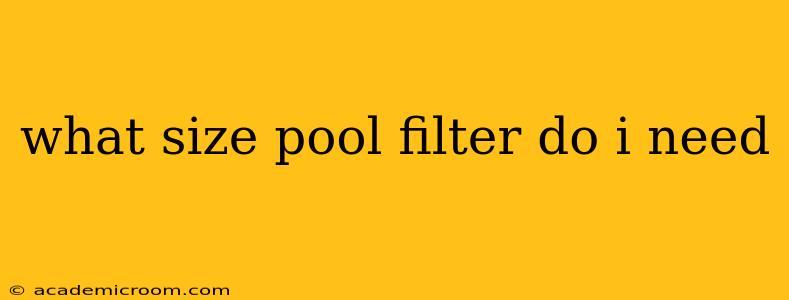Choosing the right pool filter is crucial for maintaining sparkling clean and healthy water. A filter that's too small will struggle to keep up, leading to cloudy water and potential equipment damage. Conversely, an oversized filter might be unnecessarily expensive and consume more energy. So, how do you determine the correct size? It's not a simple one-size-fits-all answer, but this guide will walk you through the key factors to consider.
What Factors Determine Pool Filter Size?
Several factors influence the size of the pool filter you need. Ignoring any of these could lead to an inadequate or overly powerful system.
-
Pool Size: This is the most obvious factor. Larger pools naturally require larger filters to handle the greater volume of water. Consider both the surface area and the depth of your pool.
-
Pool Type: In-ground pools generally require more powerful filters than above-ground pools due to their larger size and higher water volume.
-
Number of Swimmers: Heavier use from numerous swimmers increases the amount of debris and contaminants entering the water, necessitating a more robust filtering system.
-
Type of Filter: Different filter types (sand, cartridge, DE) have varying filtration capacities. A sand filter, for example, generally requires a larger size to achieve the same filtration rate as a cartridge filter.
-
Desired Turnover Rate: The turnover rate refers to how long it takes for the entire pool's water volume to pass through the filter. A faster turnover rate (generally recommended to be between 6-8 hours) requires a larger filter.
-
Climate: Hotter climates may require larger filters due to increased evaporation and potential for algae growth, demanding more frequent filtering.
How to Calculate the Right Pool Filter Size
There's no single formula to precisely calculate filter size, but a good starting point is to use the pool's gallonage and the desired turnover rate. You can find your pool's gallonage through online calculators (many are available with a quick search) that take your pool's dimensions as input. Once you have the gallonage, divide it by the desired turnover rate (in hours). This will give you the gallons per hour (GPH) needed from your filter.
Example: A 15,000-gallon pool with a desired 6-hour turnover rate would need a filter with a GPH of at least 2,500 (15,000 gallons / 6 hours = 2,500 GPH). Remember this is a starting point, and other factors may influence your final decision.
What Size Pool Filter Do I Need for a Specific Pool Size? (Addressing the PAA)
Unfortunately, a precise answer to this question isn't possible without knowing all the contributing factors mentioned above. However, we can offer some general guidelines:
Small Above-Ground Pools (under 10,000 gallons):
Often require smaller filters with GPH ratings between 500 and 1,500.
Medium Above-Ground Pools (10,000-20,000 gallons):
Typically need filters with GPH ratings between 1,500 and 3,000.
Large Above-Ground Pools (over 20,000 gallons) and In-Ground Pools:
May require filters with GPH ratings of 3,000 and above. The specific size will depend on other factors like the pool's shape, depth, and frequency of use.
What type of pool filter is best?
The "best" filter type depends on your specific needs and budget. Sand filters are generally less expensive, while cartridge filters require less maintenance and offer better filtration. Diatomaceous earth (DE) filters provide the finest filtration but require more maintenance.
How often should I replace my pool filter?
The frequency of filter replacement depends on the filter type and usage. Cartridge filters typically require replacement every 1-2 years, while sand filters need less frequent replacement but require backwashing regularly. DE filters require frequent cleaning and element replacement.
What are the signs I need a new pool filter?
Signs you may need a new pool filter include cloudy water that doesn't clear after cleaning, reduced water flow, increased pump run time, and a filter that consistently requires backwashing or cleaning.
Conclusion: Seek Professional Advice
This guide provides valuable information, but ultimately the best approach is to consult with a pool professional. They can assess your specific needs, considering all the relevant factors, and recommend the most suitable pool filter for your unique situation. Remember, investing in the right filter will ensure clean, healthy water and protect your pool equipment for years to come.
